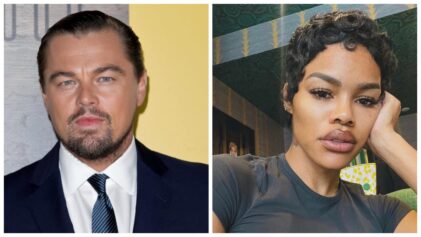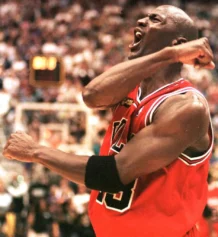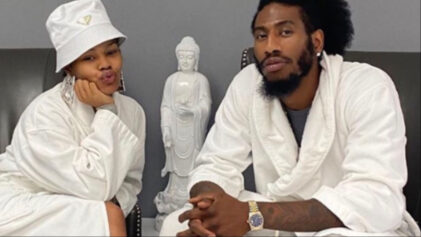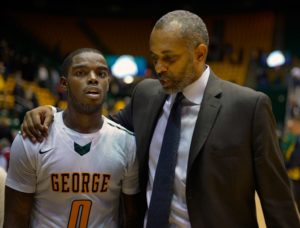
There is a war on young Black men in America, as the news shows us every day, and a Black coach from New York with book sense and street smarts rates as a valuable commodity, especially in these times.
Hewitt’s basketball teams at George Mason did not get it done, for various reasons that are boring and do not matter now. It would have been nice if they could have benefitted from Hewitt’s insight and won games, like much of his stay at Georgia Tech. But over four years at George Mason, they were one game under .500 and did not make the NCAA Tournament. Not good.
But sometimes it has to be more than about winning. Sometimes it has to be about providing young men the kind of conscious leadership that will help shape their lives. That was Hewitt’s invaluable strength—to all his players, not just Black kids.
That’s why he was able, as coach of Georgia Tech, to land first-rate recruits Chris Bosh, Derrick Favors, Thaddeus Young, Iman Shumpert, Anthony Marrow, Javaris Crittenton, Jarrett Jack and others. He had something to offer them that resonated beyond basketball.
Last year, Hewitt took to ESPN radio to challenge Jeff Van Gundy, the former NBA coach and current analyst who claimed on the air that college athletes were not interested in getting an education. That was considered by many code for singling out Black athletes.
For Hewitt, a father of three girls and staunch advocate education, that hit a nerve.
Hewitt said of Van Gundy’s comments: “I thought to myself ‘Man, the general public must think really poorly of us. So later in the day before practice, I played his comments to my players and I didn’t say anything, I just said ‘I want you to listen to this and have a discussion about it.’
“A lot of people were offended. They said ‘Coach, that’s what they think of us?’ (I told them): ‘Unfortunately, stereotypes are very strong to beat down in our society and it’s up to you guys to make sure that you take full advantage of what you have here.’ I think the overwhelming majority do, [but] I think oftentimes we get bogged down by stereotypes and really don’t step back and take a big picture look at what’s really going on in the American education system.”
That was classic Hewitt, taking on causes. He took his platform as a big-time coach who led Georgia Tech to the NCAA Tournament Championship Game in 2004 as an opportunity to promote his players and to change the played out narrative about athletes, especially Black athletes, and raise awareness on important issues around the sport on a national platform.
That’s why he held the position of president of the Black Coaches Association—he has the poise and generalship of a politician. A true politician, not one of the ones who are close-minded and selfish, an embarrassment to the country.
Hewitt, 51, has been a proponent of college athletes getting paid, understanding there is a serious disparity in the ratio of money they generate for colleges against the deprived backgrounds from which many of them come.
He also has pushed for a change to the rule that allows players to leave college after one season. And it really draws his ire when people like Dallas Maverick owner Mark Cuban blame college for the “one-and-done” rule that has diminished college basketball and sent unprepared players to the NBA when they were too young.
“The Cuban thing really confused me,” Hewitt said. “The NBA ‘one-and-done rule’ is something that was instituted by the NBA owners, so if Mark Cuban has a problem with that rule, he and the owners should get together and repel it. That’s not an NCAA rule. A 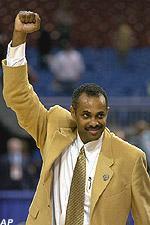
“Number two, 18-year-olds are going to act like 18-year olds. Over my years, I’ve had kids like Chris Bosh and Derrick Favors and Thaddeus Young and guys who have gone one-and-done, and those kids were model students at Georgia Tech. I can remember the last exam Chris Bosh took before he put his name in the draft was his calculus exam.
“What I’ve found over the years is when they get about to their junior year and they start to realize their dream of professional basketball is ‘a lot harder to obtain then I thought‘ or ‘I’ll never reach it’… then education becomes really important to them. Which is very similar to the normal 18-year-old kid who comes in with a lot of options. The fewer options you have, the more interest you have (in getting an education).”
One of Hewitt’s prized recruits, Crittenton, found himself in trouble that no one could have projected for the kid when he was under Hewitt. He was charged with the murder of an Atlanta woman in 2011. Hewitt was a top Crittenton character witness that allowed him to receive bail. (The case has not gone to trial yet.) In the worst case scenario, Hewitt stood up for his player.
In firing Hewitt, George Mason athletic director Brad Edwards said: “Paul has always been a tremendous advocate for the sport of college basketball and we are extremely appreciative for the manner in which he has represented the university and for his service to the student-athletes and to the program.”
Maybe someone will see the value in Hewitt and hire him. He’s deserving of an opportunity with more of an upside than George Mason, which was not exactly a sexy place for recruits to flock.
Chances are, if we’re lucky, Hewitt will take a TV analyst job, where he has some experience and would be a fresh, honest voice and an advocate for change benefitting the young Black athlete, first and foremost. We need Paul Hewitt on that wall.
